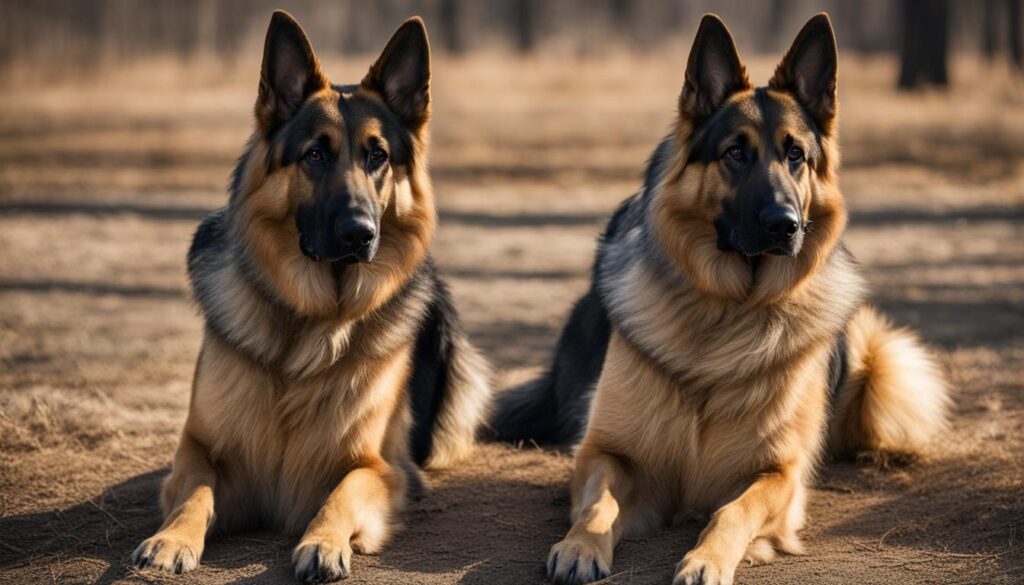If you’re a proud owner of a German Shepherd, you may be wondering how long your furry friend will be by your side. On average, the lifespan of a German Shepherd is between 9 and 13 years. However, several factors can influence their life expectancy.
According to German Shepherd lifespan statistics, genetics is one of the primary factors that contribute to their longevity. Generally, the healthier their genes and breeding, the longer their lifespan.
Aside from genetics, environmental factors play a vital role in determining the lifespan of German Shepherds. Factors such as diet, exercise, and proper healthcare can significantly impact their lifespan.
Key Takeaways:
- The average lifespan of a German Shepherd is between 9 and 13 years
- Genetics and environmental factors can influence a German Shepherd’s lifespan
- Proper healthcare, diet, and exercise can help increase a German Shepherd’s lifespan
- Consult with a veterinarian to ensure your German Shepherd is receiving the best possible care
- By providing your German Shepherd with a healthy lifestyle, you can help ensure a long and happy life for your furry best friend.
Factors Affecting German Shepherd Lifespan
German Shepherds are known for being one of the most loyal and intelligent dog breeds, but like all living creatures, their lifespan is influenced by various factors. Some of these factors are genetic, while others are environmental. By understanding these factors, you can take steps to increase your German Shepherd’s lifespan naturally and provide them with a long, healthy life.
Genetic Factors
The lifespan of a German Shepherd is influenced by genetic factors such as breed lines, health issues, and inherited diseases. While some health issues can be addressed through proper care and treatment, others cannot. It is essential to research and select a reputable breeder who follows responsible breeding practices and provides health guarantees for their puppies.


Environmental Factors
Environmental factors play an important role in the lifespan of your German Shepherd. Proper nutrition, exercise, and regular veterinary check-ups can increase your dog’s chances of living a long and healthy life. Exposure to toxins, such as secondhand smoke or chemicals, can also impact their lifespan negatively. By creating a safe and healthy environment for your furry friend, you are helping to increase their chances of living a long life.
Tip: To improve your German Shepherd’s lifespan, be sure to provide them with a nutritionally balanced diet, regular exercise, and plenty of love and affection.
It is also essential to provide your German Shepherd with preventative protection against common health issues, such as fleas, ticks, and heartworms. By staying ahead of these issues, you can help your dog maintain their overall health and prolong their life span naturally.
Caring for a Senior German Shepherd
As your German Shepherd enters their golden years, it’s crucial to adjust their care routine to meet their changing needs. By implementing a few simple changes, you can help your senior companion stay healthy and happy for years to come.
Keep Up with Regular Veterinary Check-Ups
Regular visits to the vet are essential for detecting any health issues that may arise in your senior German Shepherd. Routine check-ups can help catch diseases, such as arthritis, heart disease, and cancer, early on when treatment is most effective. Schedule check-ups at least twice a year, and don’t hesitate to take your furry friend to the vet if you notice any concerning changes in their behavior or health.
Provide a Nutritious Diet
A healthy diet is crucial to maintaining your senior German Shepherd’s health and extending their longevity. As your furry friend ages, they may require fewer calories and a different balance of nutrients. Speak to your veterinarian about switching to a senior-specific diet, formulated to meet the specific nutritional needs of older dogs. Avoid overfeeding and limit treats to prevent obesity, which can exacerbate joint problems and heart disease.
Ensure Adequate Exercise
Although your senior German Shepherd may not have the same energy levels as before, they still require regular exercise to stay healthy and happy. Tailor their exercise routine to their needs, keeping in mind any joint problems or mobility issues. Short, frequent walks and low-impact activities, such as swimming or gentle playtime, can help keep your senior German Shepherd fit and happy.
Manage Any Health Issues
If your senior German Shepherd develops any health issues, such as arthritis or heart problems, work closely with your vet to manage their condition effectively. Your vet may recommend additional supplements, medication, or therapy, such as acupuncture or physical therapy. With proper care and management, your senior German Shepherd can continue to enjoy a comfortable and fulfilling life.
FAQ
How long does a German Shepherd live?
The average lifespan of German Shepherds is typically between 9 and 13 years. However, with proper care and attention, some German Shepherds can live even longer.
What factors can affect the lifespan of a German Shepherd?
Several factors can influence a German Shepherd’s lifespan. These include genetics, diet, exercise, overall health, and access to regular veterinary care. Providing a healthy and balanced lifestyle can help prolong your German Shepherd’s life naturally.
How can I increase the lifespan of my German Shepherd?
There are several steps you can take to enhance the longevity of your German Shepherd. Providing a nutritious diet, regular exercise, mental stimulation, and routine veterinary check-ups are crucial. Additionally, maintaining a safe and stress-free environment and avoiding harmful substances are important for their overall well-being.
How should I care for my senior German Shepherd?
Caring for a senior German Shepherd involves some special considerations. It’s important to provide a well-balanced diet suitable for their age and changing nutritional needs. Regular veterinary check-ups become even more crucial to monitor their health and address any age-related issues. Regular exercise, mental stimulation, and joint support can help keep your senior German Shepherd active and comfortable in their later years.

